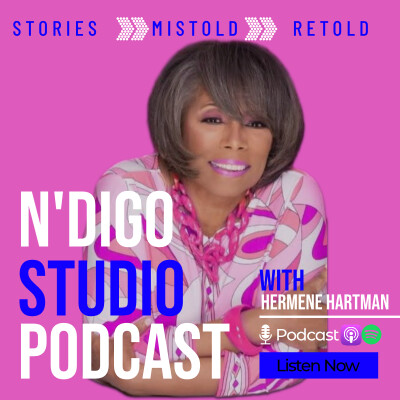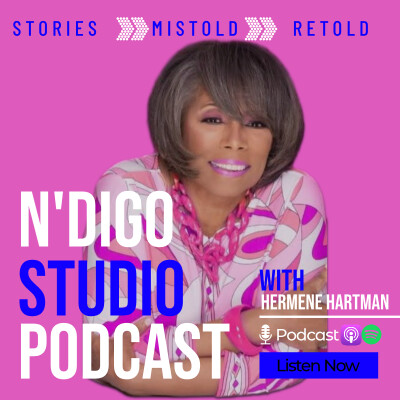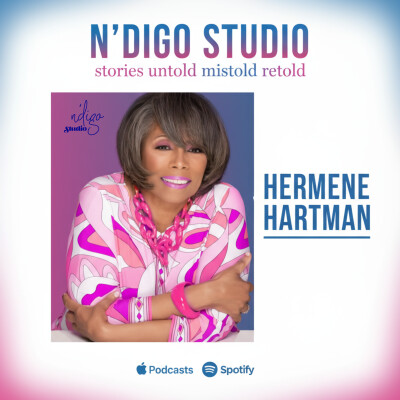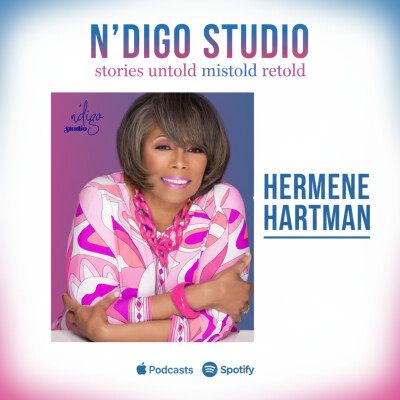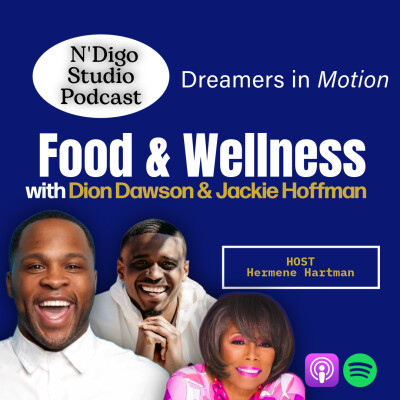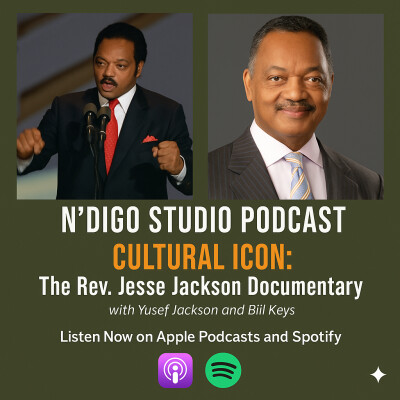- Speaker #0
Hi, I'm Hermene Hartman and welcome to Indigo Studio. We've got a very interesting conversation today. It is historic to now. It is about your roots and finding who your family is and knowing what that story is. On May 8th, 2025, the world got a new pope. Robert Francis Prevost became Pope Leo XIV. Born in Chicago, Southside, Mercy Hospital. He lived in Country Club Hills as a child with his family, which is a southern suburb of Chicago. Upon tracing the new Pope's family tree, we got to New Orleans and discovered his lineage. Is the Pope a black American? Well, we're going to find out. If we trace his roots, we find that definitely he has African American ancestors. His maternal grandmother lived in the 7th Ward of New Orleans, and genealogy records show that his mother was a black-slash-Mulatto descent. So, what's black? The Black Codes of yesteryear says that anyone with African blood in their veins is black. Louisiana laws classify anyone with a mixture of Negro blood as a colored person. And then there's the one-drop rule. And the one-drop rule simply says if you have one drop of black blood, then you are black. So today we're going to talk about these things from yesteryear to today and our guest is Christopher Smothers. He's a genealogist and he's going to share details about the Pope and our other guest is Dr. Stephen Rogers. He also looked up his family tree as a gift from his daughter from the Civil War and you might know a little bit more about me. Because this is a complex process, but it has some simplicity to it. So today we're going to talk about these things from yesteryear to today. Christopher, thank you for being with us. Tell us about genealogy, history, and finding your story. How do you start? Where do you start? How do you do it in the first place?
- Speaker #1
Well first I want to thank you for having me on the show.
- Speaker #0
You're welcome.
- Speaker #1
It's an honor to be here. And the beginning of genealogy should start with oral history. It should start with you having conversations with trusted elders in your family, if you have them. And in cases where you have a collection of people who don't necessarily have the receipts of that memory, then an autosomal DNA test might be where you want to start.
- Speaker #0
With the DNA test?
- Speaker #1
Yeah.
- Speaker #0
Oh, okay. So Stephen, your daughter gave you a precious gift for your birthday. Right. What did she give you?
- Speaker #2
In 2022, she gave me the services of Christopher Smothers to do research on our family, specifically to find out who our ancestors were. I was only able, up until that time, to go back to my grandparents. I never knew anything else. About anybody else in my family, but I was able to go back further than that. In fact, over 200 years as a result of his services and what it did her mean that gift. It took the nameless. It took the faceless. It took the story list people in my family and it gave them names and it gave them life to me. And so it was one of the greatest gifts that I've ever been given. My daughter Ariel gave it in 2022. We spent time with Christopher via Zoom. He was in New Orleans during that time, and sometimes I cried and sometimes I laughed, but it was a great gift.
- Speaker #0
So you found a six-year-old who was your great-great-grandfather?
- Speaker #2
I found a young boy by the name of Ishmael Brown, and Ishmael Brown, I was given from Christopher, I was actually given his bill of sale.
- Speaker #0
Bill of sale from slavery.
- Speaker #2
His bill of sale from slavery when Ishmael Brown was sold from one Brown family member to another Brown family member, both of them being white, that was their last name Brown. And so the two brothers. One of the brothers sold Ishmael Brown to his other brother. That was the bill of sale that I actually received, showing that this little boy, Ishmael Brown, had a price tag of $75 in 1831. And so it was, as you used the word earlier today, it resulted in a high level of mourning and grieving for this little boy. I've written a story about Ishmael Brown, and because... 35, excuse me, 29 years later, there was a young man who was 35 years old, and he signed up to serve in the United States Colored Troops to fight in the Civil War, to fight against slavery. And he was 35 years old when he signed up, and his name was Ishmael Brown.
- Speaker #0
So you were able to trace Ishmael from six years old to the Civil War. Yes. Fighting in the Army.
- Speaker #2
I was able to take, like, you know, what did that song, Daylight and Darkness, at the same time. I was able to take darkness of finding my relative, my great-great-grandfather when he was six years old, enslaved as a little boy, and then take him to 1864 when he served in the military as a patriot in this country, serving basically his country to fight against slavery that had been in existence for 246 years.
- Speaker #0
Now, Christopher, you did considerable research on the Pope. Tell me what you found out about the Pope.
- Speaker #1
You know, the entire, I would say, revelation of the Pope's ancestry was really birthed out of an initial post from a really respected, well-known genealogist named Jari Honore. Jari actually is a distant cousin of mine through our shared ancestry.
- Speaker #0
Is that Colonel Honore's family?
- Speaker #1
No. Jari made a post, and I called him up, and we had a conversation about... Um, You know, sharing this with ABC and through that process, I feel like, and I'll just be candid, a lot of people in the community wanted to kind of break that story, get it out there. But I'm the genetic genealogy director, program director for the GU272 Descendants Association. And as the director, I help people identify their ancestors who were enslaved by the Jesuits. of the Catholic Church.
- Speaker #0
The Jesuits had slaves?
- Speaker #1
Indeed, indeed. And the Jesuits were responsible for selling hundreds of people from Georgetown University, or Georgetown College, in order to save that, you know, institution in 1838. And I'm a descendant of one of those 272 people.
- Speaker #2
Is that true?
- Speaker #1
Yes. Of one of the Jesuits? My ancestor was Betsy Dorsey. She was on the Catherine Jackson in 1838 when they left from Alexandria, Virginia and came to New Orleans. and we're sold to Governor. Henry Johnson. I say all of that to say I'm also, you know, descendant of people who are very tied to the Catholic Church and its history. And so I wanted to, I'll say it like this, the black experience with Catholicism in America has been suppressed. The notable black Catholics in America that history hasn't really been told in the fullest light. There have been people who have tried to tell that history and advocate for that. equitable, you know, storytelling piece of it. But I wanted to use this as a moment of reckoning so that leaders of the Catholic Church, the Jesuits, the archbishops could use this as an opportunity to diversify the narrative and confront the generational misrepresentation of Black Catholics.
- Speaker #3
Whether you're considering an electric vehicle at work or at home, Making the switch may not be as complex or expensive as you think. The tools, resources, and rebates available at ComEd.com slash EV make transitioning to an electric vehicle easier and more cost-effective than ever before. Charge into the future at ComEd.com slash EV. At ComEd. We understand a little help can really make someone's day. That's why we provide financial assistance and billing options to help you pay and manage your electric bill. Use the ComEd Smart Assistance Manager to discover bill assistance and savings options designed with you in mind.
- Speaker #0
Walk me through the Pope's Lynch.
- Speaker #1
Walk me through. Okay, so Robert Prevost, Pope Leo XIV, is the son of Mildred Martinez. And her father, okay, let me just say this.
- Speaker #0
She's classified as mulatto.
- Speaker #1
No, she's classified as white. Oh, as white, okay. Yeah, she was born here in Chicago as well. But her parents were born in New Orleans. She's one of the younger siblings. Her older siblings were born in New Orleans. and Her father had a cigar shop here in Chicago and they moved to Chicago from the 7th Ward in New Orleans. Her father was Joseph Martinez and was born in Port-au-Prince, Haiti. And he was anything beyond Mildred. Like they were always identified as black until they came to Chicago and then they started passing for white. Passez Blanc, you know.
- Speaker #0
So is the Pope black? Is the Pope, I mean, because that story, I mean, yes, he was the Pope, but then the story story was, is the Pope black or the Pope is black? So I'm asking you, because here's what, here's what I got. When I read it, my mother's name is Mildred. And when I read the New Orleans story, I was like, wait a minute, this sounds like very familiar. Like I know these people, right? Because it was my family's, you know, kind of heritage too. So. Is the Pope an African-American?
- Speaker #1
He's black-ish. That's what Dr. Gates said. I love that. Steve, black-ish. He's black-ish. I think the Pope's story is also a reminder that we are so much more complex in our ancestry than people realize. And we look, you know, everybody focuses on the external, you know, everything superficial. But, you know, when you look at our DNA, you find more opportunities to connect to. like the true diversity of who we are. And that's just the American story.
- Speaker #0
So one of the things that I found fascinating as you do your research, you're doing it through legal records. You're doing birth certificates. You're doing death certificates. You're doing Army. Walk me through the various documentation that you find for proof, because this is not imagination. This is not I think. This is what you know.
- Speaker #1
Yeah, in particular, In Louisiana, there's a, of course we know Louisiana operates underneath civil law and the rest of the United States operates under common law. And because of this...
- Speaker #0
What's the difference?
- Speaker #1
So, do you want to explain that?
- Speaker #2
Joe, you go ahead.
- Speaker #1
Okay. That's not finances. Okay. Common law, okay, I'll say this. Civil law really is originated from a French code. Okay. It essentially is more particular about... How we like the documentary evidence is created from certain things that originate from the French society that goes from you know spirituality to your you know traditional deeds of conveyance for property that we you know consider today as a common thing and I'm not an attorney but that's that's in my trajectory you know after I graduate with my masters dual masters but civil law Kind of behooves itself, you know, to create documents that record everything. And I always tell people, because of the Catholic nature of Louisiana, they document everything, no matter how shameful or revealing or disgusting it is. It's just the way of that society.
- Speaker #0
So we can find things in New Orleans that we probably can't find nowhere else.
- Speaker #1
Indeed, indeed. You know, there's things that even outside of New Orleans, if you had a notary that was operating on the outskirts of like, you know, Louisiana and Mississippi and Alabama and Georgia, you'll find notaries. And all of those things are brought back to that central notarial office, which is in New Orleans. So I found, you know, deeds of conveyance for property in Mississippi and Texas right there in New Orleans in the notarial archives.
- Speaker #0
Okay, so we have established that the Pope is blackish.
- Speaker #1
Blackish.
- Speaker #0
Okay, I like... I like your term.
- Speaker #3
Whether you're considering an electric vehicle at work or at home, the tools, resources, and rebates available at ComEd.com slash EV make transitioning to an electric vehicle easier than ever before. ComEd. We understand a little help can really make someone's day. That's why we provide financial assistance and billing options to help you pay and manage your electric bill.
- Speaker #0
How did you find, when you did Steve's Genealogy, how did you find that six-year-old? I mean, for most of us, most of us black people in America, we can go to grandparents, and if you're real lucky, you can go to a great-grandparent. Right. And you can get the oral history, and you can trace and track. Sure. But beyond the Civil War, when they... you know, because we didn't become human beings until that were recorded as such until those census, you get stuck, you just have to stop. How did you go beyond that with the Steve Rogers family?
- Speaker #1
Sure. So we started with his parents, of course, and started to compile evidence that we typically understand exists like the census, which is, you know, created and recorded to basically appoint representatives for districts and You know, allocate resources to communities and certain things like that. And the census records reveal the family units, you know, in proximity to other family units in that community. And as you walk those things back, you get back to, you know, the Reconstruction era. And during Reconstruction, his second great-grandmother, Harriet Brown, the daughter of Ishmael Brown, married a guy named Sandy Gines. She was underage and as a result they had to have parental consent.
- Speaker #0
How old was she?
- Speaker #1
I believe she was 16 or 17, something like that. Which, you know, wasn't necessarily uncommon. But it was just something that that county did a really good job of documenting the parental consent form. So you actually saw her father and Sandy's, you know, family come together to just... allow them to become married and so from that documentation that told me who who harriet's father was and that's how i got to ishmael because not only was they were actually living right next to her parents when they first got married next door yeah but that that helped me solidify that not only are they because she was married at that point um because they got married in the 1860s um but they were living right next door but that helped me say without a doubt that Ishmael, what's up? If I can,
- Speaker #2
let me just add this to it, and that is one other thing that he did was he was able to connect my family to a white family. And typically, from what I understand, and you correctly, typically what we find when we go to those records, that census, the last census or the first census that included all of the people in America, including black people, was 1870. So you go to that census 1870, it has your family's name and an address. And typically, if you look close, you can find who else is in proximity to that address, and it might be white people. And those white people who are close in proximity to that similar address as your family probably were people who were enslaved your family. And so now you get that information about that white person, and you have their name, and you can find their death certificate. You find their death certificate. and on there is a list of all of their assets, their estate. And when you get there, look at their estate, that's when you find a boy named Ishmael Brown.
- Speaker #0
Because in the estate is listed maybe by name, the slave.
- Speaker #2
Maybe by name, but typically not the enslaved person. What we typically see is a boy, probably six years old, a girl, this, but sometimes there is a name there. Okay.
- Speaker #0
But most of the time there's not.
- Speaker #2
Yeah, most of the time it's not, because be mindful. These are not considered human beings. That's why it's listed on that list with the cows, a desk, a barn, and all of that. So we were sort of fortunate to see the boy named Ishmael on there.
- Speaker #1
Well, let me clarify this a little bit. So when a slave owner dies, you have an inventory and appraisement, whether he has a will or not. And in the inventory of appraisement, there you'll find a list of people he owned as property, right? So that property is appraised. along with all the other things he owns. Yes. In the case of Ishmael Brown, we see, okay, the only time a document is created for an enslaved person is through the transfer of property, okay? Because of the legal nature of how things are written, let's say Ishmael's parents, grandparents, or let's say Ishmael wasn't sold to that final enslaver. If his family stayed in the same, you know, white family, And were never transferred because the legal language is your heirs and assigns forever unless you're sold So in the case of Ishmael, Ishmael was transferred from one person to the next. And that's why we have documentation.
- Speaker #0
It's the transaction that is recorded.
- Speaker #2
It's the transaction that's recorded.
- Speaker #0
Okay, now after Steve, after I read something, and then Steve wrote me something, and then Steve and I started talking, and then Steve did the article on Ishmael, then I printed the article on Ishmael, and I said, Steve, where is Christopher? Because I think I want to do my family. Yeah. And you did. I did my mom. I did my dad. My dad's from New Orleans. So I was relating to the Pope. I was like, some of this is just so familiar, right? I had mixed emotions. Yes, I wanted to know. And then I didn't want to know. And then I cried. And then I got happy. And then you start connecting dots. And then you start remembering from family dinners, this one to that one. And what was said. How did you really feel to find out my family's story?
- Speaker #2
I was absolutely elated to find out more information than I knew before. I was a history major in college with a focus on black history, so I loved it. I love history, and so I was really elated to find out that I could find more information out, discover I could find more information about my lineage, and that it could go back and I could discover it for 200 years. When I heard about Ishmael, it made me cry. A little boy, I just envisioned a little boy just being traumatized by that experience. So it made me cry. When I found out 30 years later Ishmael signed up for to serve in the military, it made me stand up and cheer out loud. That's my great-great-grandfather. That is the sign of what an American is, and that is he stood up for his country, he stayed here, he fought, and he said, that I am gonna be a part of. of resurrecting the life of black people in this country by helping us get out of slavery. So I went through these emotions, but at the end of it all, I am absolutely elated that I discovered it. I have a hero in my family named Ishmael Brown. I also discovered as a result, and Ishmael is on my parental side, my paternal side. On my maternal side, Christopher helped me discover some other heroes in my family, And that is Susan and Richard. duty susan was born in 1823 richard was born in 18 i think 25. she was born in kentucky he was born in louisiana um they were enslaved and they are my great great great grandparents on my mother's side you did both sides both sides of the family so as a result of that being discovered what we found out was these people were these uh beautiful heroes and sheroes uh they were enslaved as well In 1865 with the passage of the 13th Amendment, not the Emancipation Proclamation, okay, the passage of the 13th Amendment, because Emancipation Proclamation was just an executive order, it was not law, but with the passage of the 13th Amendment, they gained their freedom. They gained their freedom. Now they are now married and they live in Louisiana. They gained their freedom, Hermine, and these people start doing something amazing, which is kind of common in our Black history, and that is we come from people who are amazing. Okay, they start, I would surmise, a business probably in farming, and they have this great success. They gain wealth, and with that wealth, what they do is they do what most of us do, and that is they help our community. And so what they did was they bought land, and they donated land to the city of Alexandria, repeats Alexandria, Louisiana. They donated land to build the first elementary school for black kids. They donated land. to build the cemetery, which is now called the duty, St. Duty Cemetery. They donated land to build the first church called the St. Duty Church in this area right there. My people were part of what I characterize as heroes and sheroes. That is why it's absolutely imperative that we all do that, because what it will do for us is three things when we do this kind of search. OK, one is it tells us and it put names on our people. Two is... And with those names, as a result of that, we become emboldened, we become empowered with the realization that we come from kings and queens. And those kings and queens were right here in America. And they were patriots and they helped grow this country to what it is today. So we end up identifying with people who are from our lineage. Number two is the reason why, is because it gives us this feeling of our family actually helped build this country. And we know it no longer is this. abstract comment around our family helped build this country. I literally say Ishmael Brown helped build this country. You built this country by serving in the war, for example, in the military. No race has served in the military more than black people.
- Speaker #0
So you found all of this, like this documentation, the school, the church, you find that through the transaction. of the property. Is it important that all of us, as much as humanly possible, do this trace of history?
- Speaker #1
Well, it's bigger than genealogy. It's about reclaiming our identity, you know, and not just our knowing who we are, but the power we have.
- Speaker #2
And I will add to his comment around your question, why is this important? Another reason it's important is because of reparations. We're going to get reparations, Hermine, and will it be in our lifetime? Maybe not, but that's all right. You know, in honor of our ancestors who were abolitionists in the 1700s, somebody told them, you're never going to get free, okay? We were enslaved for 246 years. So the fight for reparations has to be a part of our lives today for the future. And we're going to get reparations, and when reparations happens, it's going to be lineage-based. Our Supreme Court is making it very clear right now. that happens no longer can just simply be based off of race. It also has to be some evidence that there was damage done to your family.
- Speaker #0
Can you tell me briefly, very briefly, what you found with me with my on my on my dad's side? That's my New Orleans side.
- Speaker #1
Your family comes from Terrebonne Parish, which is Houma.
- Speaker #0
That's right.
- Speaker #1
Houma Louisiana. And Houma is just, you know,
- Speaker #0
down the road,
- Speaker #1
just down the river, you know, and Houma has a history in and of itself. But essentially what I found was a name change, which is very common for people of color.
- Speaker #0
It wasn't Hartman? It was something else?
- Speaker #1
It was, so they, I think we kind of tiptoed on this a little bit, but it was the Shy family.
- Speaker #0
The Shy family?
- Speaker #1
Shy, S-H-Y, yeah. How did we get to Hartman? So there's a multiple like ownership thing going on here. And like right after they were emancipated, they were gone by Shy. And then in the 1880 census, they come up as Hartman.
- Speaker #0
There was a sale?
- Speaker #1
No, this is post-emancipation.
- Speaker #0
Was there marriage?
- Speaker #1
No, they just changed their name to Hartman. And I think it might have been something where they wanted to notify other people that they were separated from during slavery. Because I had an ancestor who, you know, bought 170 acres in Mississippi. And in the court document, 20 years after he was emancipated, one of the clerks knew who he was during slavery and called him by his former enslaved name, Capurl. who was the Austrian slave owner who came to Mississippi.
- Speaker #0
We are as complex.
- Speaker #1
Yeah, so, so complex.
- Speaker #2
It's complex, but it's beautiful. And that is, I no longer want my name to be associated with someone who enslaved me. Right. So I'm changing.
- Speaker #0
Discovering your roots, where you came from, it's important to know. And Christopher can help you find out. It's not hard, y'all. It's not as hard as it once was. No, it's not. And Christopher has conquered through the documentation. He can hit it for you. I'm Hermine Hartman with Indigo Studio. Thank you for a wonderful history lesson today.
- Speaker #2
Thank you for inviting me. I loved it. Thank you.
